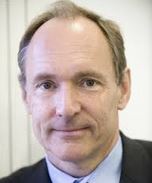Sir Timothy Berners-Lee: Catching the World in a Web
 He may not have invented the Internet, former US vice-president Al Gore did that (…), but British computer scientist Sir Timothy Berners-Lee made the World Wide Web (www) as we know it today possible by coming up with the HyperText Transfer Protocol (HTTP) which enables websites to transmit data over the net.
He may not have invented the Internet, former US vice-president Al Gore did that (…), but British computer scientist Sir Timothy Berners-Lee made the World Wide Web (www) as we know it today possible by coming up with the HyperText Transfer Protocol (HTTP) which enables websites to transmit data over the net.
HTTP constitutes a request-response protocol between servers and client computers. It was first used in November 1989 when “Tim” Berners-Lee and his colleagues at CERN – the European Organisation for Nuclear Research, then the largest Internet node in Europe –succeed in having a central computer serve up a webpage after receiving a GET request over the Internet from a user’s computer.
The page requested was written in HyperText Markup Language (HTML), a set of instructions that tells a client computer how to assemble a webpage and show it on the user’s monitor. HTML, also invented by Sir Timothy Berners-Lee and his team at CERN, still forms the basis of all websites and thus of the World Wide Web – another idea first proposed by the British scientist who, to cap it all, also built the first-ever web browser.
The world’s first website went live on August 6, 1991 at www.info.cern.ch. It explained the workings of the web, gave details about the people involved, and offered software free of charge for designing, hosting, and browsing websites.
It is hard to overstate the value of Sir Timothy’s work. Without it, the Internet as we know it would simply not exist. However, the fact that it does and changed life profoundly, may also be attributed to the decision made early on by Sir Timothy Berners-Lee to refrain from seeking monetary gain from his many inventions. He made all his ideas freely available and did not apply for any patents.
To manage the World Wide Web, Sir Timothy – now employed by the Massachusetts Institute of Technology – in 1994 founded W3C, the consortium that still is the international standards organisation for the web. W3C is made up of 385 representatives from business, academia, governments, non-profit organisations and individuals. Sir Timothy Berners-Lee remains the consortium’s director.
Currently, Sir Timothy is engaged in promoting the concept of net neutrality which holds that both Internet Service Providers (ISPs) and governmental authorities should treat all information travelling the Internet equally. “Threats to the Internet, such as companies or governments that interfere with or snoop on Internet traffic, compromise basic human network rights,” argues Sir Timothy.
The British computer scientist also lends his active support to initiatives that aim to improve access to official data. In the UK, he has been asked to help structure and launch data.co.uk, a government-sponsored project that seeks to make all data acquired for official purposes available to the public. “This project signals a wider cultural change in government based on an assumption that information should be in the public domain unless there is a good reason for it not to be – not the other way around.”
In October 2013, Sir Timothy Berners-Lee got the Big Four of the industry – Google, Facebook, Microsoft, and Intel – to join forces in the Alliance for Affordable Internet, an initiative that hopes to drive down network access costs in the developing world where still only 31% of the population is online. The alliance hopes to improve and broaden Internet access as well and has now adopted the target of the UN’s Broadband Commission which wants to see access charges limited to less than 5% of average monthly income in any given country.
Sir Timothy Berners-Lee did not just invent the World Wide Web and nearly all it entails; he was and remains instrumental in promoting and disseminating the web as a powerful tool for human development and progress.
You may have an interest in also reading…
Denise Coates Earns More Than Elon Musk, Would You Believe?
British business leader Denise Coates is the highest-earning woman in Britain — testament to the fact that the odds can
Privacy is a Right, Not a Luxury – and it’s Worthy of Protection
Data-harvesting, monitoring, ad-targeting and even industrial espionage are threats for modern Internet users – and one company has a practical
Fatema Mernissi: Beyond the Veil – A Seismic Shift in Islamic Society
An Islamic feminist may seem a contradiction in terms, but Fatema Mernissi is anything but. This Moroccan author and sociologist
















































































